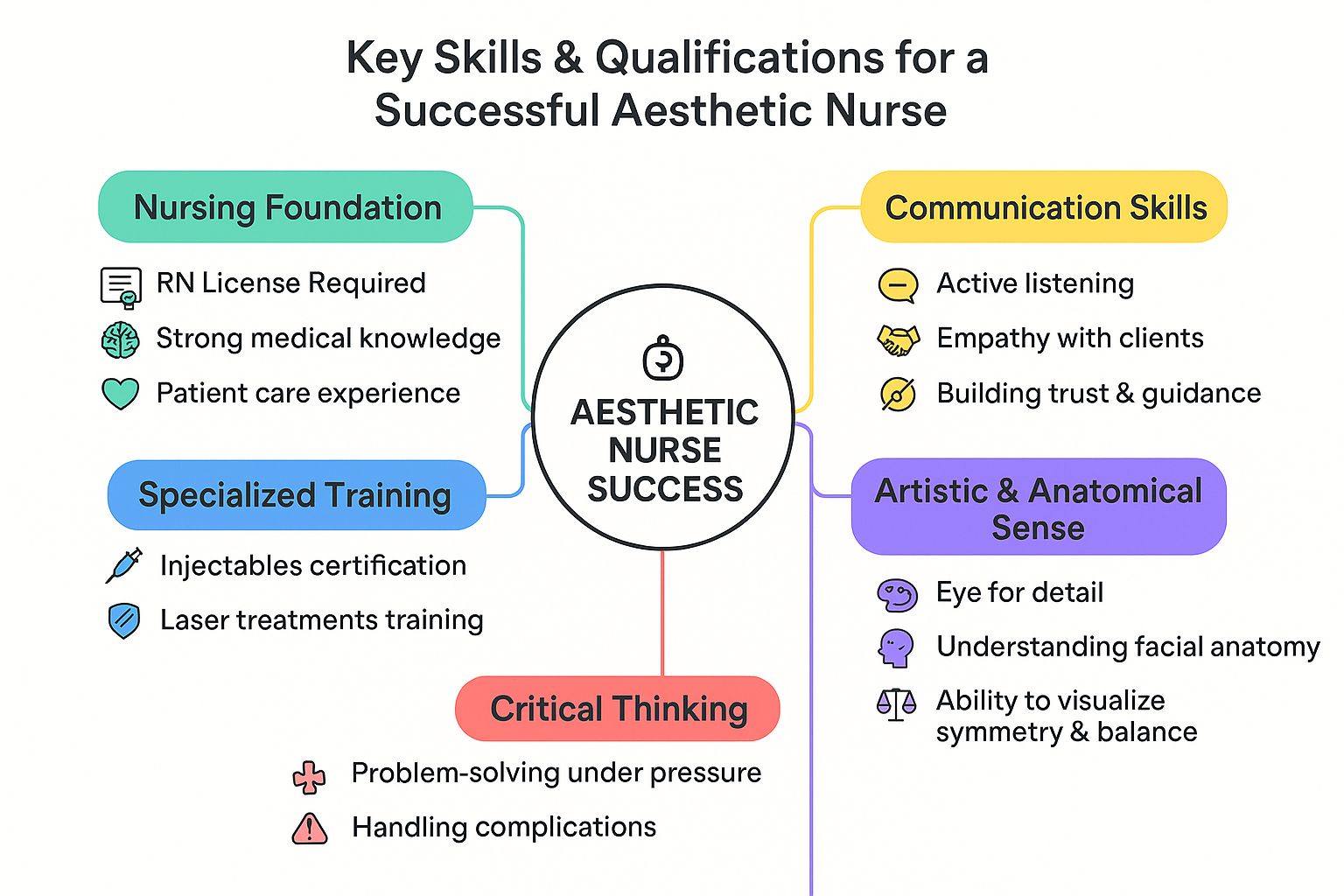A career as an aesthetic nurse is a perfect blend of healthcare and artistry, ideal for those passionate about beauty and wellness. Aesthetic nurses perform treatments such as Botox, dermal fillers, and laser therapies to help clients enhance their appearance and confidence. They need clinical expertise, an artistic eye, empathy, and a dedication to lifelong learning to succeed. Becoming an aesthetic nurse involves earning an RN license, completing specialized training in cosmetic procedures, and staying updated on industry advancements. They can work in medical spas, dermatology clinics, or plastic surgery offices, with options to start their own businesses or teach others. Ethics, patient care, and safety are central to the role, as is building trust and delivering natural, personalized results. For those passionate about combining healthcare and beauty, aesthetic nursing offers a fulfilling and dynamic career path.
Table of contents
- The role of an aesthetic nurse
- Required skills and qualifications
- Training and education for aesthetic nursing
- Job opportunities for aesthetic nurses
- The importance of patient care in aesthetic nursing
- Common procedures performed by aesthetic nurses
- Ethics and legal considerations in aesthetic nursing
- Advancements and trends in aesthetic nursing
- Pursuing a career in aesthetic nursing
Do you care about healthcare and beauty? Do you have a good eye for aesthetics and want to help people look and feel great? If yes, you could be a great fit for a career as an aesthetic nurse. Aesthetic nurses are important in helping people enhance their physical appearance and gain confidence through various treatments.
These nurses are trained to perform cosmetic procedures, such as Botox injections, dermal fillers, and laser skin treatments. They work with plastic surgeons and dermatologists to create personalized treatment plans that meet their clients’ specific needs and goals.
Besides technical skills, aesthetic nurses need strong interpersonal skills. Building trust with clients is key, as they often depend on the nurse’s advice and expertise when making decisions about their appearance.
Becoming an aesthetic nurse requires commitment and ongoing learning. If you want to combine your passion for healthcare and beauty, this rewarding career might be right for you. Let’s explore what it takes to succeed in this field.
The role of an aesthetic nurse
An aesthetic nurse combines clinical skills and artistic talent, making this job both challenging and rewarding. Aesthetic nurses mainly perform cosmetic procedures to improve a patient’s appearance. This includes giving Botox and dermal fillers, doing chemical peels, and providing laser skin treatments. They need to have strong technical skills and a good understanding of human anatomy and the aging process to achieve natural-looking results.
Besides procedures, aesthetic nurses also perform patient consultations. They evaluate what the patient needs and wants, along with their medical history, to create personalized treatment plans. Good communication is key, as they educate clients about each procedure’s benefits, risks, and expected outcomes. Building trust with clients is essential because they want reassurance and confidence in their aesthetic choices.
Aesthetic nurses also provide post-procedure care. They monitor patients for any negative reactions and give advice on aftercare to ensure the best results and reduce complications. This ongoing support shows the nurse’s commitment to the patient’s safety and satisfaction, strengthening their relationship. The diverse nature of their work means that aesthetic nurses are not just technicians; they are also educators, counselors, and advocates for their patients’ aesthetic goals.
Required skills and qualifications
To succeed as an aesthetic nurse, you need specific skills and qualifications. First, you need a solid nursing foundation, which usually includes a registered nursing (RN) license. This license requires a strong understanding of medical principles and patient care. In addition to basic nursing skills, aesthetic nurses must complete specialized training in cosmetic procedures. This often includes certifications for giving injectables and performing laser treatments, which are important for safe and effective practice.
Good communication skills are also essential. Aesthetic nurses must connect well with clients to understand their needs and concerns. Showing empathy and listening closely helps build trust, especially since clients may feel vulnerable about their appearance. Aesthetic nurses should provide reassurance and guidance to make clients feel comfortable throughout the process.

Aesthetic nurses should also have an eye for detail and an artistic sense. Since their work focuses on beauty, they need to visualize and make subtle changes that enhance a person’s features. Understanding facial anatomy and proportions helps them achieve balanced and natural results. Finally, they need critical thinking and problem-solving skills to handle any complications during or after procedures, always prioritizing patient safety.
Training and education for aesthetic nursing
Training and education for aesthetic nursing can differ based on location and specific job requirements. Generally, aspiring aesthetic nurses start by earning a nursing degree, such as an Associate Degree in Nursing (ADN) or a Bachelor of Science in Nursing (BSN). After completing their degree, they must pass the National Council Licensure Examination for Registered Nurses (NCLEX-RN) to obtain their nursing license. This education gives them the basic knowledge and skills needed for nursing.
Once they are registered nurses, those who want to specialize in aesthetics often pursue extra training through accredited cosmetic courses. These courses teach various topics, including injection techniques, laser treatments, skin care, and advanced facial anatomy. Many programs include hands-on practice, allowing nurses to learn under the guidance of experienced professionals. This practical experience is essential for building confidence and skill in performing aesthetic procedures safely.
Continuing education is important in aesthetic nursing because techniques and technologies are always changing. Many aesthetic nurses seek additional certifications or attend workshops and conferences to stay current with the latest trends in cosmetic procedures.
This focus on ongoing learning helps them provide the best care for their clients and stay competitive in the industry. By committing to education, aesthetic nurses improve their skills, knowledge, and overall success in their careers.
Book a Call
Let’s talk! Book a free call with our team and discover how we can support your goals.
Job opportunities for aesthetic nurses
Job opportunities for aesthetic nurses are growing quickly because more people want cosmetic treatments. Aesthetic nurses can work in many places, including medical spas, dermatology clinics, plastic surgery offices, and even start their own practices. Medical spas offer various services, such as facials, skin treatments, and injectables, making them a popular choice for nurses who want a lively work environment.
Some aesthetic nurses choose to run their own businesses. This allows more flexibility and the chance to create a practice that matches their goals and values. However, it also means they must handle business tasks like marketing, finances, and following regulations. For those who enjoy entrepreneurship, this can be a rewarding path.
There are also options for aesthetic nurses to teach others. They can share their knowledge about techniques and procedures through workshops, online courses, or classes at nursing schools. By educating new nurses, experienced aesthetic nurses can help prepare them to meet client needs. This field offers many opportunities and growth potential, making aesthetic nursing an attractive career for those who love beauty and healthcare.
The importance of patient care in aesthetic nursing
Patient care is central to aesthetic nursing, which requires a complete approach to treatment. Unlike traditional nursing that mainly focuses on physical health, aesthetic nursing also considers the emotional and psychological aspects of beauty and self-image. Aesthetic nurses need to understand their clients’ feelings and motivations. They provide compassionate care that meets both physical and emotional needs. This overall approach creates a supportive environment where clients feel valued and understood.
Effective patient care starts with thorough assessments and clearance exams. Aesthetic nurses must listen carefully to their clients’ concerns and expectations. This conversation is key to forming a personalized treatment plan that matches the client’s aesthetic goals. By involving clients in decision-making, aesthetic nurses help them make informed choices about their appearance. This involvement boosts client satisfaction and builds trust, which is crucial for a good nurse-client relationship.
Ongoing support and follow-up care are also important in aesthetic nursing. After a procedure, aesthetic nurses should give clear aftercare instructions and be ready to address any questions or concerns. This commitment shows the nurse’s dedication to achieving the best outcomes for their clients. By focusing on patient care, aesthetic nurses enhance the overall experience and contribute to the long-term success of their practice.
Common procedures performed by aesthetic nurses
Aesthetic nurses are skilled in various cosmetic procedures, catering to diverse client needs. Among the most common treatments they perform are Botox and dermal filler injections. Botox temporarily relaxes muscles that cause wrinkles, while dermal fillers restore volume and fullness to areas such as the cheeks, lips, and nasolabial folds. These techniques require extensive training and a deep understanding of facial anatomy to achieve natural-looking results.
In addition to injectables, aesthetic nurses often perform laser treatments for skin rejuvenation. These procedures can address various concerns, including pigmentation issues, acne scars, and overall skin texture. Laser technology has advanced significantly, providing aesthetic nurses with powerful tools to enhance their clients’ skin quality. Knowledge of different laser types and their specific applications is crucial for delivering safe and effective treatments.
Chemical peels and microdermabrasion are also popular procedures within the aesthetic nursing scope. Chemical peels involve applying a solution to exfoliate the skin, promoting cell turnover and improving skin tone and texture. Microdermabrasion, on the other hand, uses a minimally abrasive instrument to gently remove the outer layer of dead skin cells. Both procedures can be tailored to individual skin types and concerns, allowing aesthetic nurses to provide customized treatment options to their clients.
Ethics and legal considerations in aesthetic nursing
Ethics and legal issues are very important in aesthetic nursing. Because cosmetic procedures involve risk, aesthetic nurses must follow strict ethical guidelines to keep patients safe and satisfied. Informed consent is a key part of this process. Clients need to understand the risks, benefits, and expected results of any procedure before they agree to it. Aesthetic nurses must provide clear and complete information so clients can make informed treatment decisions.
Aesthetic nurses also need to maintain professional boundaries and work within their training limits. This means knowing when to refer a case to a physician, especially if the client has a complex medical history or possible complications. Nurses must prioritize patient safety and care by making referrals when necessary.
Having the proper medical oversight in place is also a key legal consideration. Depending on the nurse’s license and the service they are providing, they may need oversight from a medical director or collaborating physician. Medical oversight can be provided on-site with a doctor physically located in the building or remotely through platforms like GuardianMD.
Legal obligations include keeping accurate records of client interactions, treatments given, and any complications that occur. This documentation is important for both the nurse and the client, as it helps protect against legal issues. Aesthetic nurses need to stay updated on local laws and licensing requirements relevant to their work. Following these rules is essential for practicing legally and ethically in the aesthetic field.
Advancements and trends in aesthetic nursing
The field of aesthetic nursing is constantly changing, with new technologies and techniques shaping the industry. One important trend is the growing popularity of non-surgical treatments that deliver effective results with little downtime. For example, thread lifts use dissolvable sutures to lift and tighten the skin. This treatment is becoming popular among clients who want subtle improvements without having surgery. Aesthetic nurses need to stay updated on these developments to provide clients with the latest options.
Another key advancement is the use of technology in aesthetic procedures. Digital imaging and 3D simulations help clients see possible results before they choose a treatment. This improves the consultation process and helps clients make better decisions about their aesthetic goals. Aesthetic nurses who use this technology can create more personalized treatment plans.
Additionally, clients are increasingly interested in natural-looking results. As people learn more about cosmetic treatments, they want options that enhance their appearance without obvious signs of being “overdone.” Aesthetic nurses play an important role in helping clients achieve natural results by focusing on subtlety and balance. To meet these trends, aesthetic nurses must keep learning and be open to new techniques so they can stay at the forefront of the industry.
Pursuing a career in aesthetic nursing
Aesthetic nursing can be a rewarding career for those interested in healthcare and beauty. This field combines clinical skills with an artistic touch, allowing nurses to make a positive impact on patients’ lives. As more people seek aesthetic treatments, job opportunities in this area are growing, providing various career paths and chances for personal and professional development.
To be successful as an aesthetic nurse, you need to be dedicated to ongoing learning and patient care. You must understand different procedures, keep up with industry changes, and follow ethical practices. By building strong relationships with clients and offering excellent care, aesthetic nurses can create successful careers while helping people reach their beauty goals.
If you are passionate about aesthetics and want to help others, a career in aesthetic nursing might be right for you. Take the chance to combine healthcare with beauty and start a fulfilling journey that lets you make a difference in your clients’ lives.




